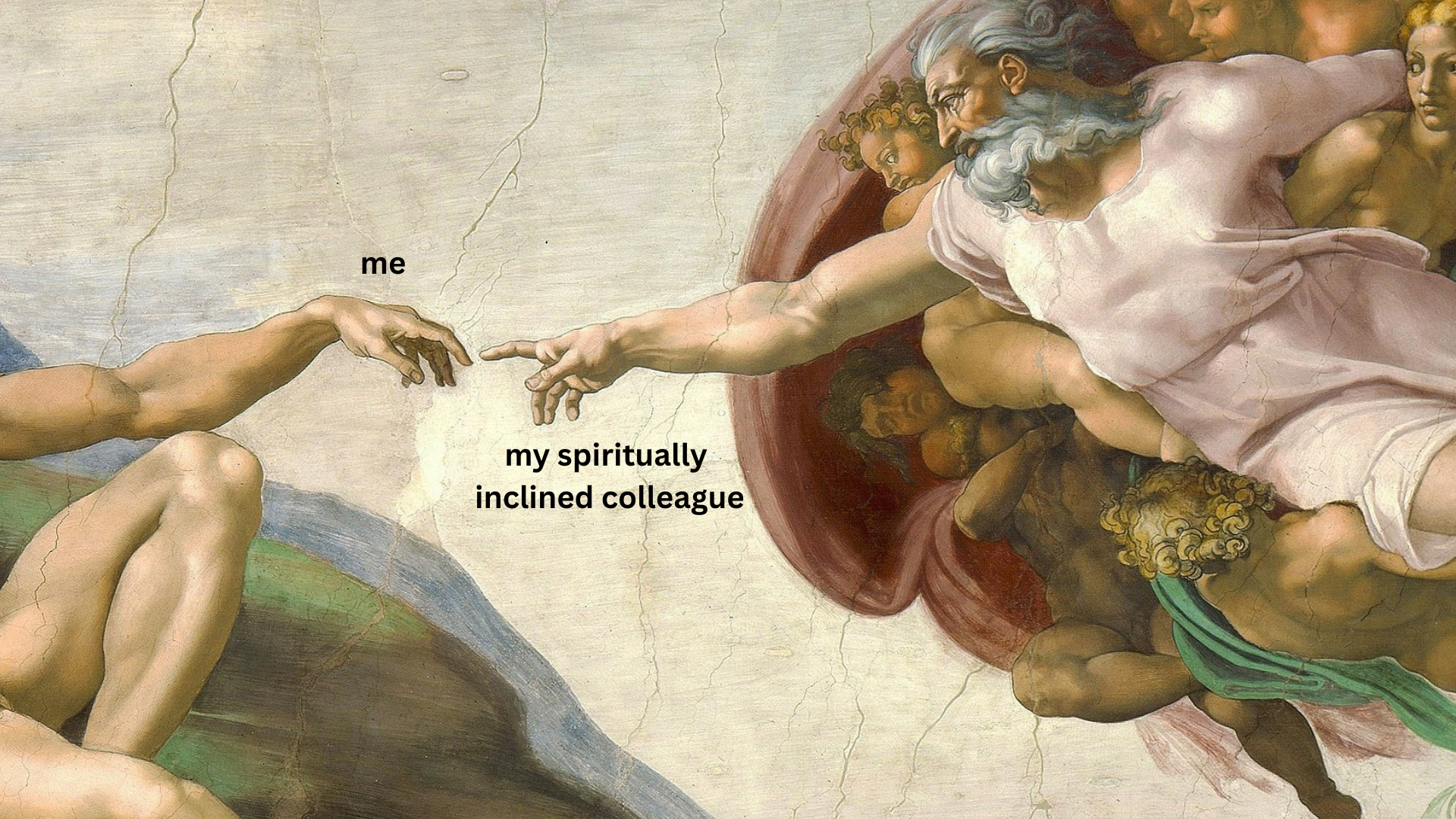The Business of Spirituality
How esoteric practices are quietly transforming organisations from the inside out.

It starts with a glimmer. We’re coming to the end of the quarterly review. The dregs of our coffees are lukewarm. The air is stuffy, and my chair creaks beneath me as I shift to stave off the numbness creeping down my left thigh.
Then she mentions completion – and the strawberry moon. There’s a pause. A look. A delicate moment where we’re both trying to work out if the other is that way inclined. Then comes the gentle reconnaissance. I tell her I watched the strawberry moon rise on the beach after a sauna and a sea swim. Before we know it, we’re swapping tips on charging our crystals and wondering how this full moon is affecting the wider team’s productivity. Suddenly, I really like this woman.
Increasingly my work conversations are taking unexpected spiritual turns like this. So I started to question if there were more businesses out there openly using spiritual practices to guide everyday decision-making? The answer, it turns out, is yes.
The Secret’s Out
Last year, the McKinsey Health Institute conducted a global survey on spiritual health – and now openly recognises it as a pillar of workplace wellbeing. That’s McKinsey. Talking about spirituality.
Perhaps it’s our search for depth and meaning at work that is driving many individuals and organisations to integrate spiritual practices into the workday. While mindfulness and meditation have become commonplace, many organisations are venturing even deeper – and sharing about it openly.
Closer to home, when I talk to the team at Protein about spirituality it's like talking about the weather. They make it seem completely normal to have a dedicated CDO (Chief Divination Officer) role within the organisation – as, perhaps, it should be within all businesses. They use Tarot spreads to kick-off client workshops and uncover hidden dynamics. Guided visualisations to help teams access insights they’d never reach through traditional brainstorming. Meditative spaces to create room for genuine creativity, not just performative idea-generation. And birth charts to align personalities in ways Myers-Briggs doesn't come close.
Abb-d Taiyo, SEED CLUB member and founder of design and impact agency Driftime Media, told me how an annual psychedelic trip acts as a reset for his business. Throughout the rest of the year, spiritual practices are embedded in the rhythm of the week. Every Wednesday, the team comes together for 30 minutes to just be. No small talk. No shop talk. Just meditation. The space is sacred – not just physically, but in Driftime’s digital workspace too.

Why Traditional Strategy Is Failing
As the lines between humans and machines blur, one thing remains true: businesses are living systems. A purely rational approach limits our capacity to help organisations grow and thrive.
Helen Bailey, CEO of market research company Aviatrix and a trained systemic constellation practitioner, uses her practice to unblock energy within businesses. She told me that as companies evolve, leaders often bury the past. But the founder’s presence always lingers. Ignoring that history has consequences. Organisational trauma must be acknowledged and processed. Endings must be honoured for energy to move in the right direction. People’s bodies respond physically to truth and authenticity. For employees to work sustainably, they must understand the story of the business – and their place in it.
Brand strategist and SEED CLUB member Jon Jacobsen uses archetypes, systems and sequences that help people locate themselves emotionally, intuitively and professionally. He gives form to intangible states: grief, desire, potential. Like Bailey, he believes any significant shift – a restructure, a rebrand, even a failure – must be fully understood and collectively honoured.
This kind of energetic work gets to the root of organisational dysfunction. Traditional corporate strategy treats symptoms. Could spiritual practices offer an answer to burnout and directionless leadership? Might the most “alternative” tools turn out to be the most effective?

Infiltrating Business As Usual
Spirituality in business may be surprisingly practical – but can it ever be truly accepted in corporate settings?
Ishita Agarwal, founder of The Cosmic Touch – “a community for generalists and creative changemakers” – thinks it can. She uses spiritual practices to engage corporates and social impact organisations around topics like personal branding and AI. Her workshops, which include reiki and meditation, have an average user engagement rating of 9.5. Participants frequently return, seeking deeper alignment in their roles, at work and beyond.
It seems many practitioners are undergoing a kind of spiritual evolution. Wellness consultants are weaving spiritual work into their practice. Business strategists are integrating energetic tools into their facilitation. At the leading edge, creative organisations are letting divination guide strategic direction.
The Business Case
Make no mistake: spirituality in business isn’t just a fun trend. Over half of global companies now promote mindfulness as part of their wellbeing offerings. A Swedish study on altered states of leadership found that both lifetime hours of meditation and insights gained during psychedelic experiences were positively linked to self-reported leadership effectiveness. It’s clear that humans are seeking deeper connection at work, and progressive organisations are realising that spiritual practices are becoming essential to an aligned and authentic work cultures.

These spiritually integrated businesses don’t just feel better – they perform better. They enjoy a competitive brand advantage, attracting clients who value depth, creativity and purpose. They combine intuition and rationality in decision-making. And they’re brave enough to express who they really are.
What's Next?
Soon, there will be no more whispering in corners about the “spooky stuff” once deemed inappropriate for the boardroom. I’m running a workshop this October, introducing organisations to modern spiritual practices that can help them get unstuck. It’s part of a broader shift, from consultants sneaking reiki into wellness budgets to corporates defining job titles for their spiritual strategists.
A generational shift is also underway. Today’s emerging workforce, which has been raised in an era of political turmoil and climate anxiety, is demanding authenticity. They want to be themselves in their careers, and they want to make a difference. For them, the search for meaning isn’t optional. It’s a means of survival.
As it happens, the approach that has been dismissed as “woo woo” for so long is turning out to be refreshingly practical. The companies integrating spiritual practices into their everyday routines and practices are addressing the invisible forces that are holding them back, while everyone else rearranges spreadsheets. Ultimately, businesses have a choice: harness the messy, beautiful, creative power of their people, or keep pretending they’re machines. And we can know how that story ends.
For further reading, check our New Spirituality Report
| SEED | #8327 |
|---|---|
| DATE | 17.06.25 |
| PLANTED BY | ROSE RADTKE |


